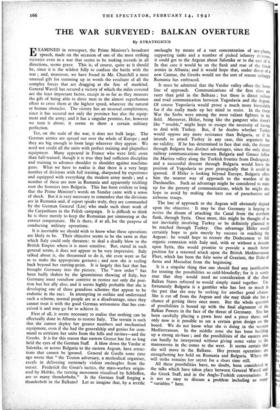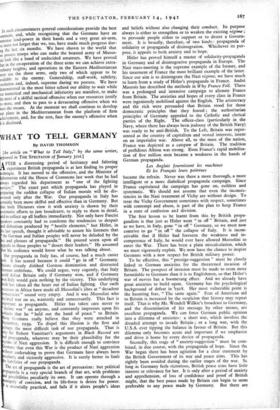THE WAR SURVEYED : BALKAN OVERTURE
By STRATEGICUS
EXAMINED in retrospect, the Prime Minister's broadcast speech, made on the occasion of one of the most striking victories even in a war that seems to be making records in all directions, seems grave. This is, of course, quite as it should be, since it is the wildest folly to confuse the battle with the war ; and, moreover, we have found in Mr. Churchill a most unusual gift for summing up in words the resultant of all the complex forces that are dragging at the fate of mankind. General Wavell has secured a victory of which the miles covered are the least important factor, except in so far as they measure the gift of being able to drive men to the almost superhuman effort to cross them at the highest speed, whatever the natural or human obstacles. The victory has an unusual completeness, since it has secured not only the province but also the equip- ment and the army; and it has a singular promise, for, however we turn it about, it seems to show a certain military perfection.
Yet, on the scale of the war, it does not bulk large. The German armies are spread out over the whole of Europe ; and they are big enough to loom large wherever they appear. We need not credit all the units with perfect training and pluperfect equipment. Many appeared in France who were link more than half-trained, though it is true they had sufficient discipline and training to advance shoulder to shoulder against machine- guns. What we have to realise is that there is a very large number of divisions with full training, sharpened by experience and equipped with everything the modern army needs ; and a number of these are now in Rumania and apparently trickling over the frontiers into Bulgaria. This has been evident so long that the Prime Minister's words on Sunday came with a sense of shock. But it is very necessary to remember that the divisions are in Rumania and, if report speaks truly, they are commanded by the German General (List) who made such short work of the Carpathians in the Polish campaign. It is difficult to think he is there merely to keep the Rumanian pot simmering at the correct temperature. He is there, if at all, for the purpose of conducting military operations.
It is inevitable we should wish to know what these operations are likely to be. Their objective seems to be the same as that which Italy could only threaten: to deal a deadly blow to the British Empire where it is most sensitive. But, stated in such general terms, it does not appear to be very impressive. Italy talked about it, she threatened to do it, she even went so far as to make the appropriate gestures ; and now she is reeling back beyond her starting-point. It is largely this fact that has brought Germany into the picture. The " new order " has been badly shaken by the ignominious showing of Italy, but Germany must somehow contrive to restore not only the posi- tion but her ally also; and it seems highly probable that she is developing one of those grandiose schemes that appear to be endemic in the race. In attempting to outline and understand such a scheme, normal people are at a disadvantage, since they cannot treat it with the good German seriousness that has con- ceived it and may go far to achieve it.
First of all, it seems necessary to realise that nothing can be effectually done in Albania to restore Italy. The terrain is such that she cannot deploy her greater numbers and mechanised equipment, even if she had the generalship and genius for com- mand to extricate her units from the hills and ravines—and the Greeks. It is for this reason that eastern Greece has for so long held the eyes of the German Staff. A blow down the Vardar at Salonika, or across Bulgaria to the eastern Aegean, have attrac- tions that cannot be ignored. General de Gaulle some time ago wrote that " the Teuton adversary, a methodical organiser, excels in delivering extremely violent onslaughts from the outset. Frederick the Great's tactics, the mass-warfare origin- ated by Moltke, the turning movement visualised by Schlieffen, are so many thunderbolts." Is the German Staff forging a thunderbolt in the Balkans? Let us imagine that, by a terrific onslaught by means of a vast concentration of aeroplanes, supporting tanks and a number of picked infantry divisions. it could get to the Aegean about Salonika or to the east of it. In that case it would be on the flank and rear of the Greek armies in Albania; and it would hope that, under threat of a new Cannae, the Greeks would see the sort of reason unhappy Rumania has embraced.
It must be admitted that the Vardar valley offers the better line of approach. Communications of the first class are rarer than gold in the Balkans ; but there is direct railway and road communication between Yugoslavia and the Aegean. Of course Yugoslavia would prove a much more formidable foe if she really made up her mind to resist. In the Great War the Serbs were among the most valiant fighters in the field. Moreover, Hitler, being like the gangster who doesn't like " trouble," might hope to escape the necessity of having to deal with Turkey. But, if he doubts whether Turkey would oppose any more resistance than 'Bulgaria, or if he intends to attack Turkey in any case, this argument has no validity. If he has determined to face that risk, the descent through Bulgaria has distinct advantages, since the only direct railway communications between Bulgaria and Greece follow the Maritza valley along the Turkish frontier from Dedeagatch; and a successful descent through Bulgaria would leave the position of Yugoslavia so poor strategically that it could be ignored. If Hitler is looking beyond Europe, Bulgaria offers him the nearest way of approach to the warden of the Dardanelles. Such an advantage might be considered to make up for the poverty of communications, which he might also hope to avoid by making the best use of parachutists and airborne troops.
The line of approach to the Aegean will obviously depend upon the objective. • It may be that Germany is hoping to revive the dream of attacking the Canal from the northern flank, through Syria. Once more, this might be thought of as not inevitably involving Turkey or be definitely planned to be reached through Turkey. One advantage Hitler would certainly hope to gain merely by success in reaching the Aegean: he would hope to restore the Dodecanese to full organic connexion with Italy and, with or without a descent upon Syria, this would promise to provide a much better position for a renewed attack upon the British Mediterranean Fleet, which has been the bite noire of Graziani, the Duke of Aosta and Mussolini from the beginning.
It is a singular thing that one should find any justification for treating the possibilities so cold-bloodedly; for it is surely true that they would need no consideration if the three Balkan States referred to would simply stand together. Un- fortunately Bulgaria is a gambler who has lost so much in the past that she may be seeking for another good chance. She is cut off from the Aegean and she may think she has a chance of getting there once more. But the whole question of possibilities is bound up with the final alignment of the Balkan Powers in the face of the threat of Germany. She has been carefully placing a pawn here and a piece there, and only now is it possible to see a certain grim design on the board. We do not know what she is doing in the western Mediterranean. In the middle zone she has been building up a strong air-base ; and the possibilities of the eastern area can hardly be interpreted without giving some value to the manoeuvres in the zones to the west. It seems certain that she will move in the Balkans. Her present operations are strengthening her hold on Rumania and Bulgaria. Where she will strike remains her secret for a short time still.
All these possibilities have, no doubt, been considered in the talks which have taken place between General Wavell and the Greek Staff, and in the Anglo-Turkish conversations. It is not so easy to discuss a problem including so manY " variables " here. In such circumstances general considerations provide the best ernment, and, while recognising that the Germans have an nanense land-power in their hands and a very great air-arm, cc must not forget that we, too, have made much progress dur- ng the last six months. We have shown to the world that ve possess troops who can make the boasted army of Musso- ini look like a band of undecided amateurs. We have proved ;hat in the co-operation of the three arms we can achieve extra- xdinary heights; and operations in the Eastern Mediterranean must use the three arms, only two of which appear to be available to the enemy. Generalship, staff-work, subtlety, resolution and, indeed, supreme daring we possess. We have demonstrated in the most bitter school our ability to wait while our numerical and mechanical inferiority are manifest, to make the most of a skilful tactical offensive when our resources justify oo more, and then to pass to a devastating offensive when we have the means. At the moment we shall continue to develop our plans in the Mediterrannean from the platform of firm achievement, and, for the rest, face the enemy's offensive when it is disclosed.































 Previous page
Previous page